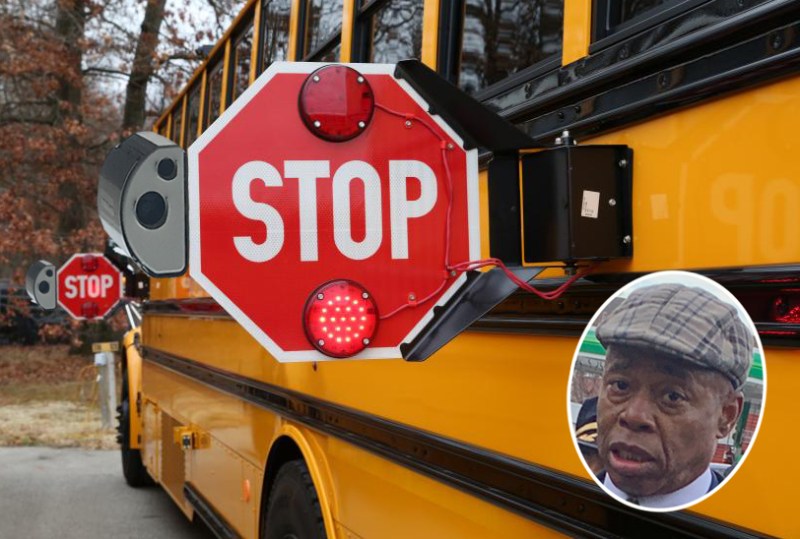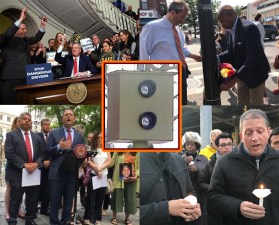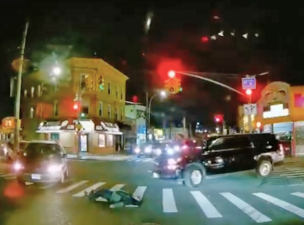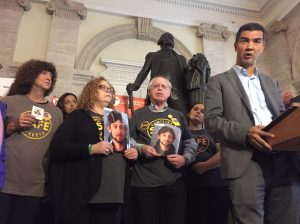As School Returns, Mayor Adams Keeps a Street Safety Tool in the Drawer

Reading, writing and … a missed metric.
The Adams administration has opted not to set up a Council-requested program to catch drivers who ignore flashing red lights on school buses even though one of the co-sponsors of the Council’s initiative now runs the Department of Transportation.
According to Local Law 10, a bill sponsored by then-Council Member Ydanis Rodriguez that passed in the last days of the previous mayor’s tenure and became law in the first days of Mayor Adams’s term, the city is now empowered to set up a “a stationary or mobile school bus photo violation monitoring system” with the express purpose of catching drivers who “fail to comply” with existing laws barring drivers from passing a school bus with its “stop” lights flashing.
Rodriguez is now commissioner of the Department of Transportation, which would have likely been the agency assigned to oversee the program (the bill had left that up to the mayor’s discretion). The bill also required to issue an annual report to the Council about the program’s effectiveness.
“This law was an innovative way to further our goal of promoting street safety,” Council Member Keith Powers, one of the bill’s co-sponsors, told Streetsblog. “I encourage the mayor and the Department of Transportation to take advantage of this opportunity to keep our children safe.”
The DOT declined to comment, referring requests to City Hall, which issued the following statement:
“The Adams administration will do whatever it takes to keep children safe as they travel to and from school. We are exploring this particular issue and evaluating whether this kind of program would have a significant impact.”

It seems likely that Mayor Adams will find suddenly cite an impact; a City Hall spokesman claimed that not many serious injuries are caused by such driver behavior and there have been no deaths from someone driving around a school bus with its “stop” arm out since at least 2014.
Statistics on such crashes in New York City are not available because of insufficient reporting by the NYPD, but Streetsblog discovered in an exhaustive investigation earlier this year that streets with schools on them are far more dangerous during pickup and drop-off hours than other city streets during the same hours.
During the 8 a.m. hour, when hundreds of thousands of children stream into 1,600 city-run public schools, there are 57 percent more crashes and 25 percent more injuries per mile on streets near schools than on the city’s other streets. This disparity largely disappears on days when schools are closed.
Streets are especially dangerous outside schools where most students are poor or children of color. In the 2019 school year, for example, the rate of people injured by drivers on school days was 43 percent higher outside school buildings where a majority of students were brown or Black than outside school buildings with majority-white students.
And there’s also no question that school bus stop-arm cameras work. The Long Island town of East Meadow installed cameras on just 10 school buses in 2019. In just one month of the program, the “cameras recorded 615 illegal and dangerous passes,” Corey Muirhead, a vice president at Logan Bus and Affiliates, the company whose buses were fitted with the cameras, told the City Council [PDF].
The Wall Street Journal reported earlier this year that two dozen states have laws authorizing school bus-mounted cameras, so it’s hard to argue that such systems are controversial. And the National Highway Traffic Safety Administration reported last year that from 2010 to 2019, 240 school-age children were killed in school-transportation-related crashes — and 144 were either occupants of the school bus or on the sidewalk. So its hard to argue that drivers are always safe around school buses.
Still, it’s no surprise that the city declined to implement the law, given that DOT testified against it at a late 2019 hearing overseen by Rodriguez. In its testimony, the DOT previewed what has become the Adams administration’s take, saying, “There have been no deaths in New York City caused by [drivers ignoring bus stop lights], nor is it a significant cause of injuries.” (That said, it does happen too often, and is in fact so commonplace that media accounts don’t always report the driver had gone past a blinking red warning.)
Despite the DOT testimony, activists pointed out that drivers who ignore the flashing lights on a bus are, in fact, a source of significant danger to kids. Transportation Alternatives testified that a study showed that drivers had sped past school buses with stop lights illuminated 13 million times every year in the United States — and that the vast majority of these infractions are not punished.
And StreetsPAC, the city’s only political action committee focused on road safety, argued that “there are few transgressions a driver can commit that are more egregious than passing a stopped school bus picking up or discharging children.”
That group said the “callous” act occurs thousands of times per day in the state of New York.
“It’s gravely disappointing that the city decided to not set up its own enforcement program,” StreetsPAC’s Eric McClure told Streetsblog this week. “We all know that NYPD, with its $10-billion-plus budget, isn’t writing any tickets for illegal passes of school buses, and very few for any other illegal maneuvers, so why not take some of that money and invest it in a technology that actually will hold dangerous drivers accountable?”
Muirhead gave heart-reading testimony in support of the bill on behalf of the drivers of his company’s buses.
“There are no two ways about it — drivers who recklessly pass stopped school buses endanger our children’s safety,” he said. “School bus drivers are hired to operate the vehicles safely, not to record traffic infractions [by] hurriedly trying to write down license plate numbers” of scofflaws. Muirhead argued that the presence of even a few cameras would deter recklessness around school buses.
“School bus stop-arm cameras save lives,” he said. “Given the mayor’s Vision Zero agenda, I look forward to the day I equip all of Logan’s buses with this important safety tool.”
He will have to keep waiting. One caveat to the Council bill is that it did not mandate that the mayor create the pilot program, but only stipulated that such a system “may be installed and operated” (emphasis added). And City Hall touted its support for, and successful implementation of, 24/7 speed cameras, which are already showing renewed success at reining in reckless drivers who had previously been able to speed with impunity on weekends and the hours between 10 p.m. and 6 a.m.
The success of speed cameras only points to the need for more cameras, said Cory Epstein of Transportation Alternatives.
“Automated enforcement works, and we should be exploring new ways to use this Vision Zero tool to save lives on our streets — especially to keep kids safe,” he told Streetsblog. “The City Council overwhelmingly approved this pilot last year and we are disappointed that the Adams administration hasn’t yet made it happen. Failing to implement legislation passed by the Council sets a bad precedent for the city and the future of our streets.”


